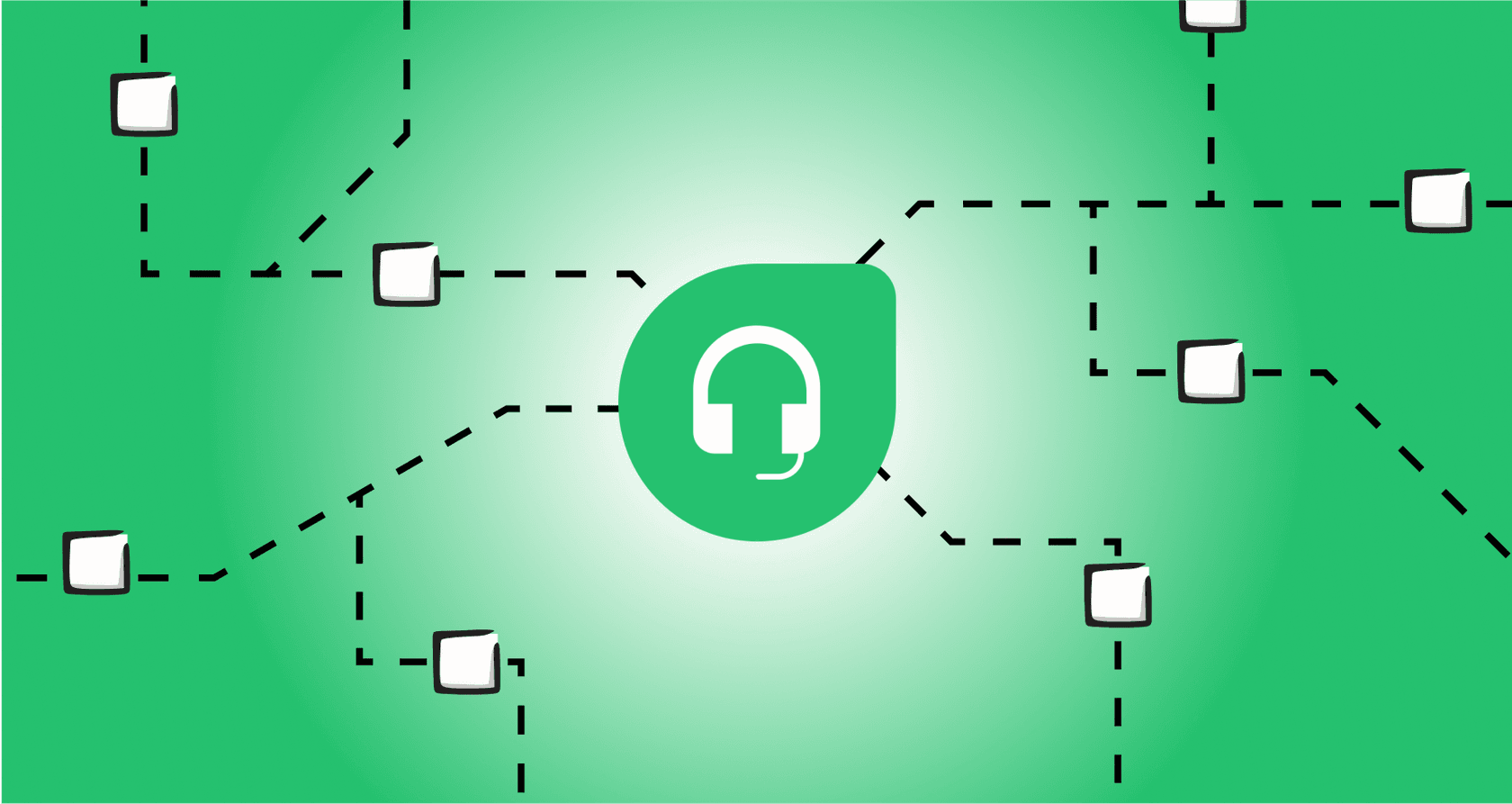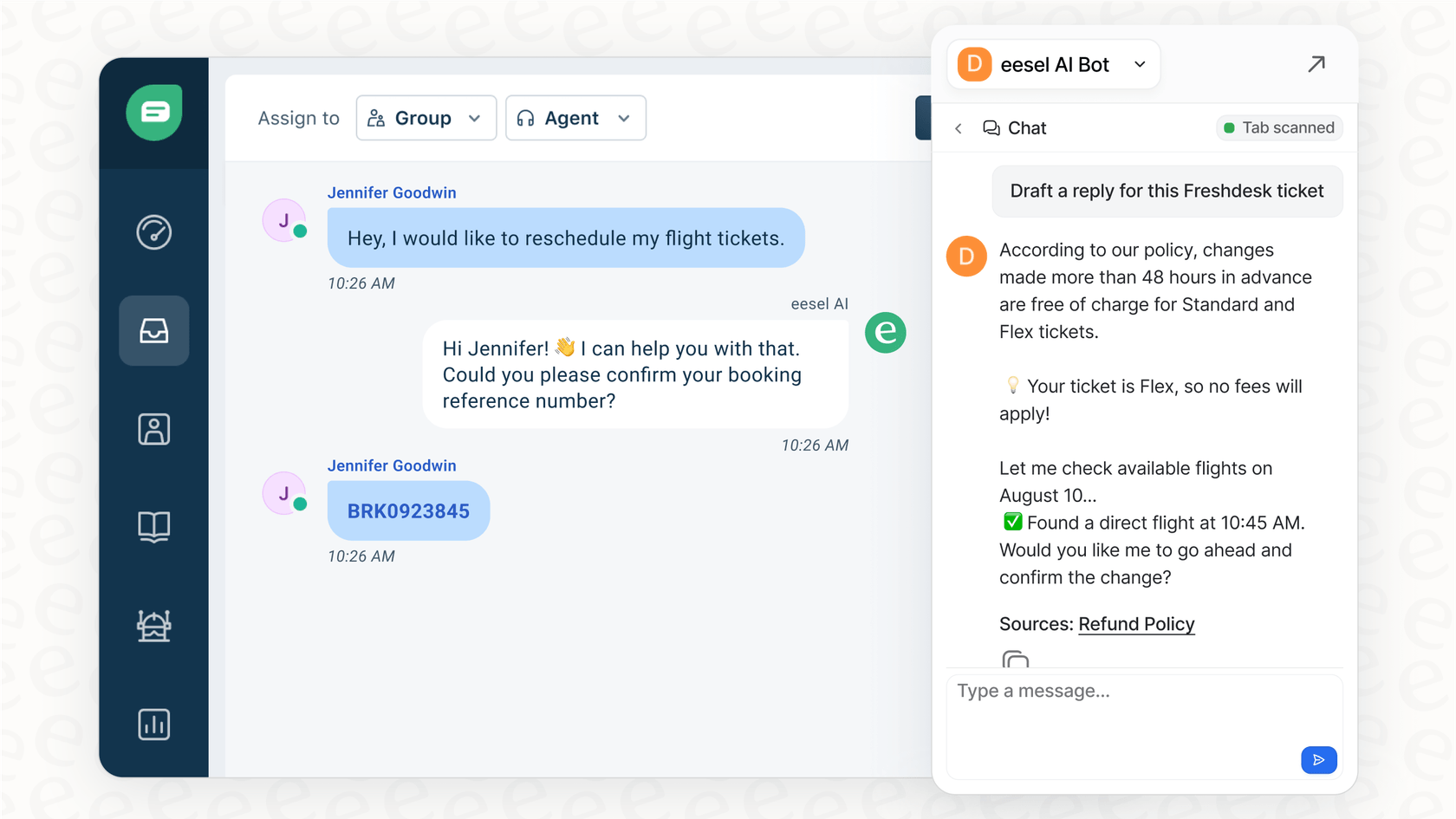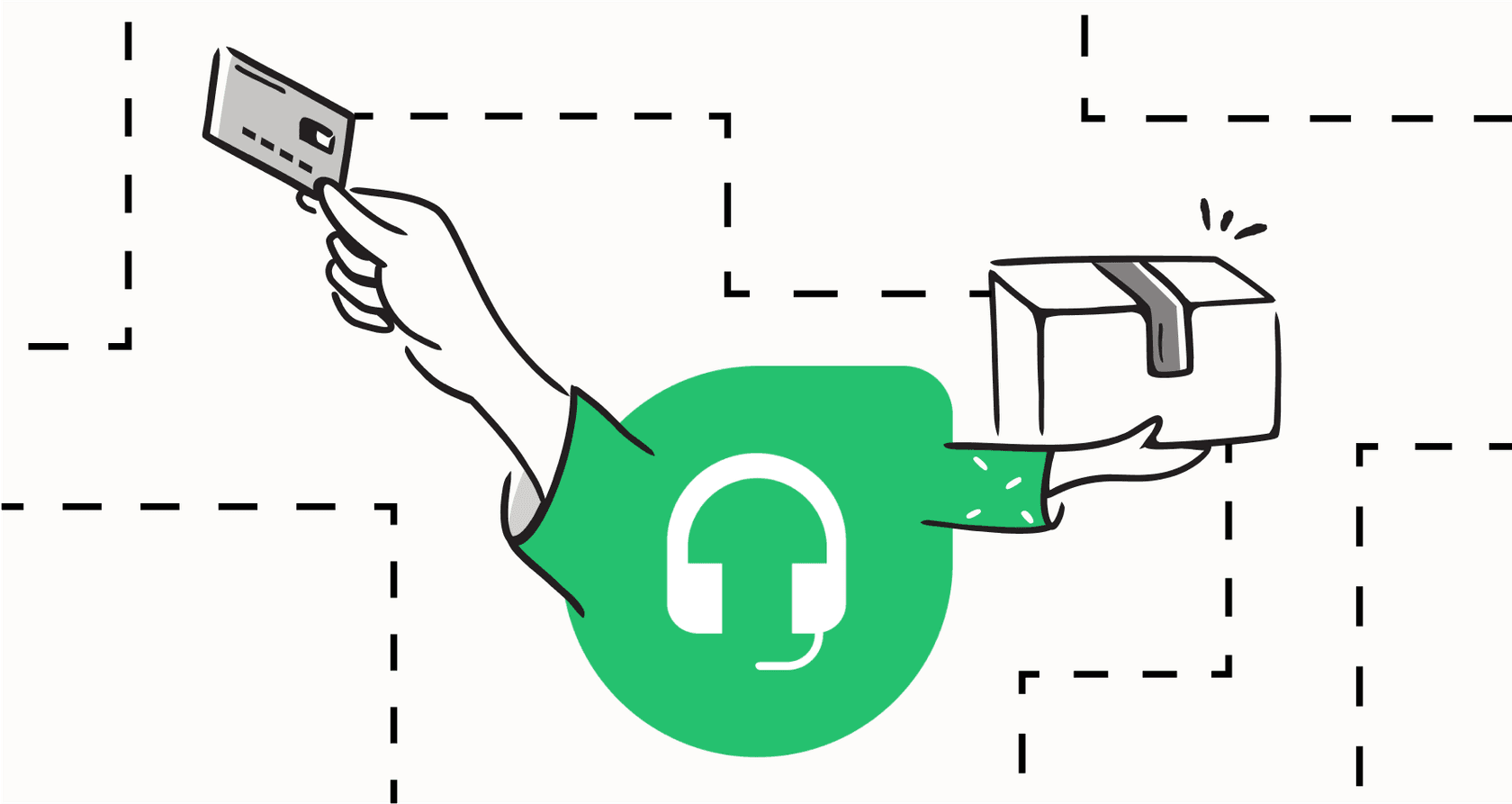A complete guide to Freshdesk resolution SLA in 2026

Stevia Putri

Stanley Nicholas
Last edited January 16, 2026
Expert Verified

Let’s be real for a second. Your customer doesn't really care how fast you send that first "We got your ticket!" email. What they care about is getting their problem solved. The resolution time is the real MVP of customer support metrics, and it's a huge factor in whether a customer sticks around.
By using a Freshdesk resolution SLA timer in your helpdesk, you can build a reliable strategy for success. Hitting those targets consistently means your team has the structure they need to be fast, accurate, and efficient. Freshdesk provides a powerful foundation for managing these goals, and with the right approach, you can ensure your team is always ahead of the curve.
This guide will break down how Freshdesk resolution SLAs actually work, look at how to get the most out of the built-in tools, and show you a smart, AI-powered way to supplement your workflow to not just meet your goals, but leave them in the dust.
What is a Freshdesk resolution SLA?
A Service Level Agreement (SLA) is basically the promise you make to your customers about the level of service they can expect. While it's easy to get caught up in first response times, the Freshdesk resolution SLA is the one that truly counts. It defines the maximum time it should take to completely fix a customer's issue from start to finish.
Here are the moving parts that make it tick inside of Freshdesk:
-
Resolution time vs. first response time: The first response just says "I see you." The resolution says "I fixed it." A quick first reply is nice, but a fast resolution is what builds loyalty.
-
Ticket priorities: You can set different deadlines based on how urgent an issue is. Freshdesk usually breaks this down into Low, Medium, High, and Urgent. A critical bug report will have a much tighter SLA than a simple "how-to" question.
-
Business hours vs. calendar hours: You can set your SLAs to only count down during your team's working hours (Business Hours) or have them run around the clock (Calendar Hours). This keeps the clock from ticking when nobody's there to answer.
-
SLA timers: The clock starts ticking the moment a ticket is created or reopened. You can pause it by changing the ticket status to something like 'Pending' when you're waiting for a customer to reply. The timer officially stops once the ticket is marked as 'Resolved' or 'Closed'.
How Freshdesk's native tools manage resolution SLA policies
Freshdesk gives you a robust set of built-in tools to define and watch over your resolution SLAs. These are the building blocks for tracking performance, providing clear structure and visibility for your support operations.
Setting up Freshdesk resolution SLA policies and targets
You can find these settings under Admin > Workflows > SLA Policies. This is where you create the rules that assign SLAs to tickets based on things like their source, type, or priority. For each rule, you set the target resolution time for each priority level. This gives you the control to define what your team can handle while keeping customers happy and expectations clear.

Using automations for SLA management
To ensure consistent performance, Freshdesk uses automations like Escalation Rules. You can set up rules that automatically notify a manager if a ticket is approaching its SLA deadline.
This is helpful for providing visibility and ensuring support is available when needed. It acts as a reliable safety net, helping teams coordinate effectively so that no ticket is overlooked. This setup encourages proactive ticket management, giving managers the chance to offer support or redistribute workloads before a deadline is reached.
Freshdesk provides the essential framework for success, and agents can easily update ticket statuses to pause the clock when needed. It’s an excellent system for showing you exactly where your team stands, and it can be further enhanced by tools that help agents find answers even faster to close tickets more efficiently.
Key metrics for tracking SLA performance
The analytics dashboard in Freshdesk has reports that show how your team is doing against your SLA goals. These numbers are important for seeing the big picture and identifying areas where your team is excelling or where they might need more support.
Here are the key metrics you’ll be looking at:
-
Tickets resolved within SLA %: This is your headline number. It tells you the percentage of tickets that were solved within the promised timeframe.
-
Resolution SLA violated tickets: This is the raw count of tickets that missed their deadline. It helps you understand the scale of your workload and where to focus your resources.
-
Average resolution time: This metric shows the average time it takes to resolve tickets. You can filter it by agent, group, or priority to find opportunities to optimize your workflow.
These metrics provide a clear report card on your performance. They offer valuable insights that help you understand your team's throughput, and they serve as a great foundation for implementing further efficiency gains through AI and improved knowledge management.

Scaling your resolution strategy with AI
While Freshdesk's tools are a fantastic starting point, teams often look for ways to scale their capabilities as they grow and customer expectations evolve. You can maximize your results by supplementing Freshdesk's core features with automated insights.
Enhancing rule-based escalations
An escalation rule in Freshdesk provides a vital heads-up that a ticket needs attention. To take this further, teams can use complementary tools to provide the agent with the information they need to solve it faster. This turns a simple notification into an opportunity for quick resolution, reducing the time spent searching for answers.
Connecting knowledge sources to improve resolution times
How fast an agent can resolve a ticket often depends on how quickly they can access the right information. While Freshdesk houses your primary support data, your company’s knowledge might also live in internal wikis like Confluence or Google Docs. By using AI to bridge these sources with Freshdesk, agents can find answers instantly without leaving their helpdesk.
Managing agent workload during peak times
Freshdesk's SLA policies provide a great framework, and you can support your agents during volume spikes by automating repetitive tasks. When agents are supported by AI, they can focus on complex issues while the automation handles common queries. This maintains high support quality and helps ensure your SLAs are met even during busy periods.
Adding a dedicated AI layer that plugs right into your helpdesk is a great way to make the team you already have even more effective. It's about working alongside Freshdesk to make your setup even more powerful.
Beat your Freshdesk resolution SLA with eesel AI
Instead of just tracking timers, eesel AI works within Freshdesk to actively help your team resolve issues faster. It complements your Freshdesk setup by automating repetitive work, connecting all your knowledge sources, and giving your agents the answers they need, when they need them.
Automate your Freshdesk resolution SLA performance
The eesel AI Agent works as a helpful extension of your team. It acts as an autonomous agent on your frontline, capable of understanding and resolving common customer questions efficiently.
-
It learns from your existing data: The AI trains on your past Freshdesk tickets, macros, and help center articles. This means it can start providing accurate, on-brand answers from day one.
-
Go live in minutes: You can set up eesel AI easily to work with your Freshdesk environment. Its simulation mode is a standout feature, letting you test the AI on your historical tickets. You can see exactly how it would have improved your Freshdesk resolution SLA performance before you ever turn it on for live customers.
Unify your knowledge for faster resolutions
eesel AI helps bring your internal knowledge directly into your workflow. It connects to over 100 sources your team already uses, including Confluence, Google Docs, Notion, and more.
- Give agents an AI Copilot: The eesel AI Copilot lives right inside the Freshdesk interface. It gives agents instant, accurate draft replies based on your entire knowledge base. This reduces search time and helps every agent provide high-quality responses, directly supporting faster resolution times.

Gain full control over your resolution workflow
With eesel AI's fully customizable workflow engine, you get to decide exactly what gets automated and what goes to a human.
-
Selective automation: You can start by letting the AI handle simple, repetitive questions while escalating more complex issues to your human agents. This ensures the right queries always get the right level of attention.
-
Custom Actions: The AI can do more than just talk. It can be set up to perform actions like looking up order information from Shopify, triaging tickets to the correct team, or updating ticket fields, helping your Freshdesk workflow run even more smoothly.
A quick look at Freshdesk pricing
Freshdesk offers tiered plans to match different team sizes and needs. This variety allows companies to choose the level of support that fits their current scale. Their AI features, like the Freddy AI Copilot, are available as flexible options to further enhance the platform's capabilities.
| Plan | Price (Billed Annually) | Key Features |
|---|---|---|
| Growth | $15/agent/month | Ticketing, customer portal, reports. |
| Pro | $49/agent/month | Everything in Growth + custom portals, advanced ticketing. |
| Pro + AI Copilot | $78/agent/month | Pro plan bundled with the Freddy AI Copilot add-on. |
| Enterprise | $79/agent/month | Everything in Pro + audit logs, skills-based assignments. |
eesel AI: A simple approach to pricing
In addition to Freshdesk's plans, eesel AI offers a straightforward pricing structure for those looking to add an extra layer of automation. All core products (AI Agent, Copilot, Triage) are included in every plan, based on a clear number of AI interactions.
With eesel AI, there are no per-resolution fees, allowing you to scale your support operations with a predictable monthly cost. This works alongside your Freshdesk subscription to provide a comprehensive, budget-friendly support stack.
| Plan | Price (Billed Annually) | Monthly AI Interactions | Key Features |
|---|---|---|---|
| Team | $239/month | Up to 1,000 | Train on docs, Copilot, Slack integration. |
| Business | $639/month | Up to 3,000 | Everything in Team + train on past tickets, AI Actions, simulation. |
| Custom | Contact Sales | Unlimited | Advanced actions, custom integrations, advanced security. |
Move from tracking your Freshdesk resolution SLA to mastering it
Your Freshdesk resolution SLA is a promise you make to your customers. Freshdesk's native tools are excellent for defining and tracking that promise, providing a trustworthy foundation for any support team.
By adding a complementary AI layer like eesel AI, you can give your team even more tools to deliver on that promise every single time. It's an exciting way to shift from monitoring the clock to actively solving customer issues faster and more effectively. That’s how you turn SLAs into a true measure of your success.
Improve your Freshdesk resolution SLA: Get started with AI-powered resolutions in minutes
Ready to see how AI can further enhance your Freshdesk resolution SLA performance? You can connect your helpdesk to eesel AI in just a few clicks. Run a simulation on your past tickets and see for yourself how you can build an even faster, smarter support experience today.
Frequently asked questions
A Freshdesk resolution SLA defines the maximum time allowed to completely solve a customer's issue from start to finish. It's crucial because customers prioritize problem resolution over initial acknowledgment, making it a key driver of loyalty and retention.
You can set up a Freshdesk resolution SLA under Admin > Workflows > SLA Policies. Here, you define rules that assign SLAs to tickets based on criteria like source or priority, setting specific target resolution times for each priority level.
Yes, you can pause the Freshdesk resolution SLA timer by changing the ticket status to 'Pending' when you are waiting for a customer's reply. The timer will resume once the ticket status changes again, and stops officially when the ticket is marked 'Resolved' or 'Closed'.
Key practices include setting clear rule-based escalations to stay on top of tickets and using Freshdesk's robust reporting to identify trends. Additionally, centralizing knowledge helps agents solve problems efficiently to meet Freshdesk resolution SLA targets.
AI solutions like eesel AI enhance Freshdesk resolution SLA performance by automating common inquiries, unifying knowledge across all company sources, and providing agents with instant, accurate answers via an AI Copilot. This reduces manual effort and speeds up resolution times significantly.
Yes, Freshdesk allows you to define different Freshdesk resolution SLA policies based on ticket priorities (e.g., Low, Medium, High, Urgent) and whether the timer counts down during business hours only or calendar hours (24/7). This flexibility ensures appropriate response times for varying ticket urgency.
You can monitor Freshdesk resolution SLA performance using the analytics dashboard. Key metrics include "Tickets resolved within SLA %," "Resolution SLA violated tickets" (raw count), and "Average resolution time," which can be filtered by agent or group to identify bottlenecks.
Share this post

Article by
Stevia Putri
Stevia Putri is a marketing generalist at eesel AI, where she helps turn powerful AI tools into stories that resonate. She’s driven by curiosity, clarity, and the human side of technology.




